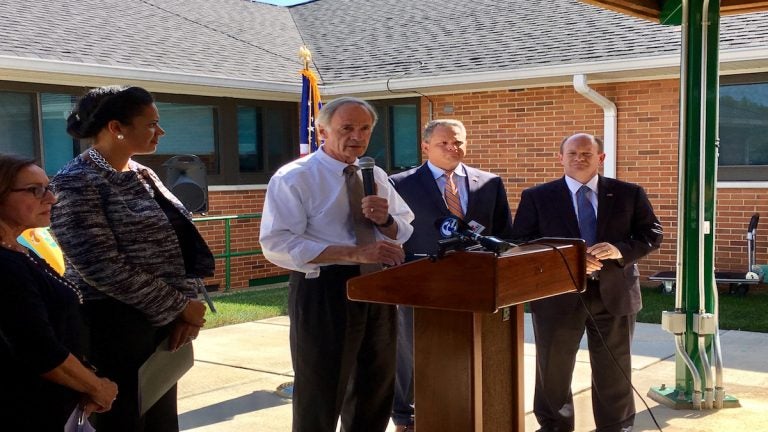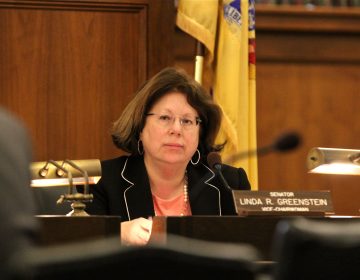Senators, health leaders, denounce latest GOP health bill

U.S. Sens. Chris Coons and Tom Carper spoke out against the latest GOP health care bill at a press conference outside the VA Medical Center in Wilmington. (Zoë Read/WHYY)
U.S. Senators Tom Carper, D-Delaware, and Chris Coons, D-Delaware, joined with the state’s healthcare leaders in a last ditch effort to encourage congress to work together to draft a healthcare bill that benefits everyone.
The latest Affordable Care Act repeal and replace proposal in the senate, sponsored by U.S. Sens. Lindsey Graham of South Carolina and Bill Cassidy of Louisiana, is the fourth GOP healthcare bill put forth in congress. They have until Sept. 30 to pass a repeal and replace bill.
If passed, states would receive block grants from the federal government, leaving it up to them to decide how to use the funds.
Some analysis estimated the bill would reduce federal health funding in the U.S. by more than $200 billion by 2026. Delaware is estimated to lose $1.2 billion by 2026.
Coons and Carper say the bill would cause millions of Americans and 81,000 Delawareans to lose health insurance.
“I call it Trump Care 2.0,” Carper said. “In a number ways, it’s worse than Trump Care the original—1.0. The number of people who get healthcare coverage; down. The access to that care; down. The quality of that care; down. The burden on the states would go up dramatically—it doesn’t stabilize the exchanges, it puts them in a death spiral. “
They say Medicaid, as well as insurance for people with pre-existing conditions, would be in jeopardy—as Medicaid expansion would be eliminated and consumer protections put in place by Obama Care would be left up to states.
There are 230,000 Medicaid beneficiaries in Delawareans, according to Health Secretary Dr. Kara Odom Walker. She said six of 10 seniors in nursing homes use Medicaid, and 20,000 Americans with disabilities rely on Medicaid.
“This Graham-Cassidy approach would…force us as a state to make hard decisions about who is deserving of care,” Odom Walker said. “Are we going to limit eligibility? Are we going to reduce coverage? Or are we just going to figure out how to pick up costs somewhere else in our system, which is already struggling to make ends meet?”
Most republicans have been silent on the latest bill, but when asked how close senators are to passing it, Coons said it’s “razor thin.”
“Yet another cliffhanger vote is injecting instability and uncertainty at exactly the time when insurance companies all over the country are deciding whether to continue to participate in healthcare exchanges,” he said. “This vote will inject chaos into the insurance marketplace if this bill goes forward. I think it’s wrong for Delaware and wrong for America.”
Carper said he believes the federal government can work together to improve what’s already in place with Obama Care by allowing more competition between insurance companies.
“We need more competition in the exchanges, we need more providers, because it will bring down the price,” he said.
“These people who testified before the health committee laid out a variety of ways to stabilize the exchanges. We should do that; that is the main thing. Once we’ve done that, use it as a way for democrats and republicans to work more broadly to improve quality of healthcare in this state and in this country.”
Insurance Commissioner Trinidad Navarro said he and other government officials have been negotiating with Highmark to stay in Delaware, and with other insurance companies to join the marketplace in the state.
“The ACA is starting to work, the costs are starting to level off,” he said. “Unfortunately, because of uncertainty in Washington D.C. companies are submitting rate filings that have assumptions that things like cost share reductions won’t be in place, and the individual mandate won’t be enforced, and up until just a few weeks ago we had great evidence or indication they would be funded, that it would be available. And here today, we stand, and we’re going backwards.”
Leaders in the health community also discussed concerns about a loss of funding to community health centers, coverage for substance abuse and mental health treatment.
Annie Slease of National Alliance on Mental Illness Delaware discussed her son’s struggle with mental illness, and how it led him to addiction, homelessness and a prison sentence.
“If this bill passes, my family’s story will likely become more common than it already it is. The cost to all of us if people don’t have mental health care will be immense—the financial cost and the human cost,”she said.
“Our criminal justice system will be even more impacted than it already is. Someone living with a serious mental illness is more likely to interact with law enforcement than with a mental health provider. That’s now—imagine the impact if even fewer people receive treatment. More people suffering, more people behind bars, a greater financial burden to all of us and more families impacted, like mine.”
WHYY is your source for fact-based, in-depth journalism and information. As a nonprofit organization, we rely on financial support from readers like you. Please give today.





